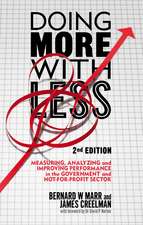Democratic Governance and Economic Performance: How Accountability Can Go Too Far in Politics, Law, and Business: Studies in Public Choice, cartea 14
Autor Dino Falaschettien Limba Engleză Paperback – dec 2011
| Toate formatele și edițiile | Preț | Express |
|---|---|---|
| Paperback (1) | 633.53 lei 6-8 săpt. | |
| Springer – dec 2011 | 633.53 lei 6-8 săpt. | |
| Hardback (1) | 639.73 lei 6-8 săpt. | |
| Springer – 28 iul 2009 | 639.73 lei 6-8 săpt. |
Din seria Studies in Public Choice
-
 Preț: 542.83 lei
Preț: 542.83 lei - 18%
 Preț: 958.38 lei
Preț: 958.38 lei - 20%
 Preț: 579.90 lei
Preț: 579.90 lei - 18%
 Preț: 780.82 lei
Preț: 780.82 lei -
 Preț: 395.09 lei
Preț: 395.09 lei - 5%
 Preț: 370.58 lei
Preț: 370.58 lei -
 Preț: 381.81 lei
Preț: 381.81 lei - 18%
 Preț: 1228.77 lei
Preț: 1228.77 lei - 15%
 Preț: 637.46 lei
Preț: 637.46 lei - 18%
 Preț: 942.63 lei
Preț: 942.63 lei - 15%
 Preț: 640.71 lei
Preț: 640.71 lei - 18%
 Preț: 945.62 lei
Preț: 945.62 lei - 20%
 Preț: 560.55 lei
Preț: 560.55 lei - 18%
 Preț: 947.50 lei
Preț: 947.50 lei - 15%
 Preț: 632.37 lei
Preț: 632.37 lei - 15%
 Preț: 635.15 lei
Preț: 635.15 lei - 15%
 Preț: 634.49 lei
Preț: 634.49 lei - 15%
 Preț: 635.01 lei
Preț: 635.01 lei - 15%
 Preț: 638.89 lei
Preț: 638.89 lei -
 Preț: 381.81 lei
Preț: 381.81 lei - 15%
 Preț: 640.88 lei
Preț: 640.88 lei -
 Preț: 385.62 lei
Preț: 385.62 lei -
 Preț: 393.13 lei
Preț: 393.13 lei - 15%
 Preț: 697.00 lei
Preț: 697.00 lei - 15%
 Preț: 586.70 lei
Preț: 586.70 lei -
 Preț: 389.31 lei
Preț: 389.31 lei - 15%
 Preț: 643.84 lei
Preț: 643.84 lei - 18%
 Preț: 727.00 lei
Preț: 727.00 lei
Preț: 633.53 lei
Preț vechi: 745.32 lei
-15% Nou
Puncte Express: 950
Preț estimativ în valută:
121.22€ • 126.91$ • 100.31£
121.22€ • 126.91$ • 100.31£
Carte tipărită la comandă
Livrare economică 05-19 aprilie
Preluare comenzi: 021 569.72.76
Specificații
ISBN-13: 9781461417217
ISBN-10: 146141721X
Pagini: 156
Ilustrații: XXI, 131 p.
Greutate: 0.23 kg
Ediția:2009
Editura: Springer
Colecția Springer
Seria Studies in Public Choice
Locul publicării:New York, NY, United States
ISBN-10: 146141721X
Pagini: 156
Ilustrații: XXI, 131 p.
Greutate: 0.23 kg
Ediția:2009
Editura: Springer
Colecția Springer
Seria Studies in Public Choice
Locul publicării:New York, NY, United States
Public țintă
ResearchCuprins
A General Theory and Statistical Evidence.- Theory.- Natural Experiments.- Statistical Evidence.- Implications for Political Bureaucracy, Competition Law, and Business Organization.- Politics.- Law.- Business.- Conclusion.
Recenzii
“Falaschetti skillfully synthesizes key ideas from social choice theory, organizational economics, and interest group politics to challenge conventional wisdom about the benefits of democratic governance in organizations. This is an important book for reforming how financial institutions are regulated, and corporations are governed, in the wake of the great financial market collapse of 2008.” (Margaret Blair, Vanderbilt Law)
“The scope of Democratic Governance and Economic Performance is truly commendable. While legal scholars, economists, and political scientists have raised parts of these issues before, by addressing the topic from both theoretical and empirical levels, this book provides useful perspective to anyone interested in the relationship between governance institutions and firm performance.” (Jon Klick, Penn Law)
“This insightful book shares with Madison’s “Federalist #10” a concern for potentially disruptive effects from “majority factions”. Falaschetti reminds us that some of our most costly policies result from democratic responsiveness, while some of our most successful policies come from organizations (e.g. courts, the Fed) that insulate us from democratic pressures.” (Gary Miller, Washington University, Political Science)
“The scope of Democratic Governance and Economic Performance is truly commendable. While legal scholars, economists, and political scientists have raised parts of these issues before, by addressing the topic from both theoretical and empirical levels, this book provides useful perspective to anyone interested in the relationship between governance institutions and firm performance.” (Jon Klick, Penn Law)
“This insightful book shares with Madison’s “Federalist #10” a concern for potentially disruptive effects from “majority factions”. Falaschetti reminds us that some of our most costly policies result from democratic responsiveness, while some of our most successful policies come from organizations (e.g. courts, the Fed) that insulate us from democratic pressures.” (Gary Miller, Washington University, Political Science)
Textul de pe ultima copertă
Conventional wisdom warns that unaccountable political and business agents can enrich a few at the expense of many. But logically extending this wisdom implies that associated principals – voters, consumers, shareholders – will favor themselves over the greater good when ‘rules of the game’ instead create too much accountability. Democratic Governance and Economic Performance rigorously develops this hypothesis, and finds statistical evidence and case study illustrations that democratic institutions at various governance levels (e.g., federal, state, corporation) have facilitated opportunistic gains for electoral, consumer, and shareholder principals. To be sure, this conclusion does not dismiss the potential for democratic governance to productively reduce agency costs. Rather, it suggests that policy makers, lawyers, and managers can improve governance by weighing the agency benefits of increased accountability against the distributional costs of favoring principal stakeholders over more general economic opportunities. Carefully considering the fundamentals that give rise to this tradeoff should interest students and scholars working at the intersection of social science and the law, and can help professionals improve their own performance in policy, legal, and business settings.
Falaschetti skillfully synthesizes key ideas from social choice theory, organizational economics, and interest group politics to challenge conventional wisdom about the benefits of democratic governance in organizations. This is an important book for reforming how financial institutions are regulated, and corporations are governed, in the wake of the great financial market collapse of 2008. (Margaret Blair, Vanderbilt Law)
The scope of Democratic Governance and Economic Performance is truly commendable. While legal scholars, economists, and political scientists have raised parts of these issues before, by addressing the topic from both theoretical andempirical levels, this book provides useful perspective to anyone interested in the relationship between governance institutions and firm performance. (Jon Klick, Penn Law)
This insightful book shares with Madison’s "Federalist #10" a concern for potentially disruptive effects from "majority factions." Falaschetti reminds us that some of our most costly policies result from democratic responsiveness, while some of our most successful policies come from organizations (e.g. courts, the Fed) that insulate us from democratic pressures. (Gary Miller, Washington University, Political Science)
Falaschetti skillfully synthesizes key ideas from social choice theory, organizational economics, and interest group politics to challenge conventional wisdom about the benefits of democratic governance in organizations. This is an important book for reforming how financial institutions are regulated, and corporations are governed, in the wake of the great financial market collapse of 2008. (Margaret Blair, Vanderbilt Law)
The scope of Democratic Governance and Economic Performance is truly commendable. While legal scholars, economists, and political scientists have raised parts of these issues before, by addressing the topic from both theoretical andempirical levels, this book provides useful perspective to anyone interested in the relationship between governance institutions and firm performance. (Jon Klick, Penn Law)
This insightful book shares with Madison’s "Federalist #10" a concern for potentially disruptive effects from "majority factions." Falaschetti reminds us that some of our most costly policies result from democratic responsiveness, while some of our most successful policies come from organizations (e.g. courts, the Fed) that insulate us from democratic pressures. (Gary Miller, Washington University, Political Science)
Caracteristici
Challenges conventional wisdom about the benefits of democratic governance in organizations Provides evidence how “democracy can go too far” and thus decrease economic performance Applies theory to macro-governance level (monetary, fiscal, and trade policy), intermediate-level of governance (antitrust laws and competition policies) and the micro-level (corporate governance) Includes supplementary material: sn.pub/extras
















